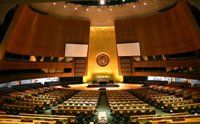Palestinian Statehood: Will It Bring Peace?
Written by Ralph Levy
 Will a UN General Assembly vote overwhelmingly in favor of Palestinian statehood make it so? Will it contribute to peace—or more conflict?
Will a UN General Assembly vote overwhelmingly in favor of Palestinian statehood make it so? Will it contribute to peace—or more conflict?
The Middle East has rarely been kind to peacemakers. In the 20th century alone, four major wars were fought between Israel and its neighbors, not counting smaller conflicts involving terrorist acts, militias and border skirmishes.
UN vote on Palestinian statehood
Against that ominous backdrop comes next month’s proposed declaration of Palestinian statehood at the United Nations. In late September, the measure will likely be put to the General Assembly. Since a veto by the United States in the Security Council is considered virtually certain, the Palestinian Authority is taking its petition to all 193 UN member states. A General Assembly resolution is less binding than a Security Council decision, but overwhelming approval is expected.
Voting in favor will be most of the 116 nonaligned member states, that is, most developing nations. It’s expected that Africa as a bloc will vote to pass the measure, along with most Asian nations, including China and India, and most Latin American nations.
Voting against will be Israel, the United States and some European nations. Germany, Italy, the Netherlands and the Czech Republic are considered likely to vote against the resolution.
However, according to an article in the Israeli newspaper Haaretz, even these nations are feeling strong pressure not to vote against the resolution. “The stance of the four European countries may change in line with the wording of the resolution that the Palestinians will propose. If the text is moderate and includes the possibility of returning to the negotiating table immediately following the vote at the UN, these four states may alter their opposition and abstain.”
Spain, Ireland and other European countries are almost certainly in the “yes” camp. Britain and France state they are waiting to see the exact wording of the resolution before deciding.
Whatever the case, Israel will be left with few friends at the UN, while the Palestinians will gain a resolution, but in all likelihood not gain a functional state. They may also receive curtailed economic support from their wealthiest supporters, the United States and Europe. Additionally, the forthcoming resolution may well trigger new violence between Jews and Palestinians.
Concerns and fears
One can understand both the concerns and the fears as violence and mistrust continue. Israel cannot help but consider the western segment of “Palestine,” the Gaza Strip, now with absolutely no Israeli presence and ruled by the Islamic Hamas movement, which is irrevocably dedicated to the destruction of the Jewish state. Intermittent rocket fire from the Gaza Strip makes life miserable and dangerous for those living in southern Israel.
Many Israelis regret their unilateral decision to pull out of the Gaza Strip in 2005 and ask whether the same hostile actions they see in Gaza might break forth from the West Bank. Can Palestinian declarations of peace be trusted?
Palestinians look at their miserable condition since the 1967 Six-Day War, and the constant encroachments of Israeli settlements well beyond the pre-1967 boundaries, and wonder if they will ever have their state as a result of direct negotiations. With on-and-off negotiations over 44 years having yielded little, they ask if Israel can be trusted.
Mutual distrust and more troubles
In the midst of mutual distrust, will this UN declaration advance the cause of a lasting and just peace? Common sense suggests no. So does Bible prophecy.
 The Bible indicates that this part of the world, and the city of Jerusalem in particular, will continue to be a center of strife and warfare right up to the end of the age. Note what God tells us in Zechariah’s prophecy: “Behold, I will make Jerusalem a cup of drunkenness to all the surrounding peoples, when they lay siege against Judah and Jerusalem” (Zechariah 12:2).
The Bible indicates that this part of the world, and the city of Jerusalem in particular, will continue to be a center of strife and warfare right up to the end of the age. Note what God tells us in Zechariah’s prophecy: “Behold, I will make Jerusalem a cup of drunkenness to all the surrounding peoples, when they lay siege against Judah and Jerusalem” (Zechariah 12:2).
The city so desired by Jews, Palestinians and others will suffer ongoing warfare in these last days. No human geopolitical designs will succeed: “I will make Jerusalem a very heavy stone for all peoples; all who would heave it away will surely be cut in pieces, though all nations of the earth are gathered against it” (verse 3).
A new Peacemaker
No, true lasting peace will not come to this part of the world as a result of United Nations resolutions, nor as the outcome of political negotiations. But it will eventually come—by divine intervention!
Notice: “Now it shall come to pass in the latter days that the mountain of the LORD’s house [the center of the future government of God] shall be established on the top of the mountains, and shall be exalted above the hills; and all nations shall flow to it. Many people shall come and say, ‘Come, and let us go up to the mountain of the LORD, to the house of the God of Jacob; He will teach us His ways, and we shall walk in His paths.’ For out of Zion shall go forth the law, and the word of the LORD from Jerusalem” (Isaiah 2:2-3).
Note the plan to bring real peace: “He shall judge between the nations, and rebuke many people; they shall beat their swords into plowshares, and their spears into pruning hooks; nation shall not lift up sword against nation, neither shall they learn war anymore” (verse 4).
The Palestinian declaration of statehood will not bring peace. There is destined to be more war and bloodshed in this part of the world. But eventually the Prince of Peace, Jesus Christ the Messiah, will bring an end to wars in the Middle East and throughout the world and bring justice for all the nations.
May God speed that day!
 Ralph Levy is a minister of the Church of God, a Worldwide Association, who grew up in England and now lives in the United States. Dr. Levy enjoys serving the Church, reading, travel and foreign languages. He has a Ph.D. in biblical studies and has worked in foreign language and religious education for much of his life.
Ralph Levy is a minister of the Church of God, a Worldwide Association, who grew up in England and now lives in the United States. Dr. Levy enjoys serving the Church, reading, travel and foreign languages. He has a Ph.D. in biblical studies and has worked in foreign language and religious education for much of his life.
Related links:








